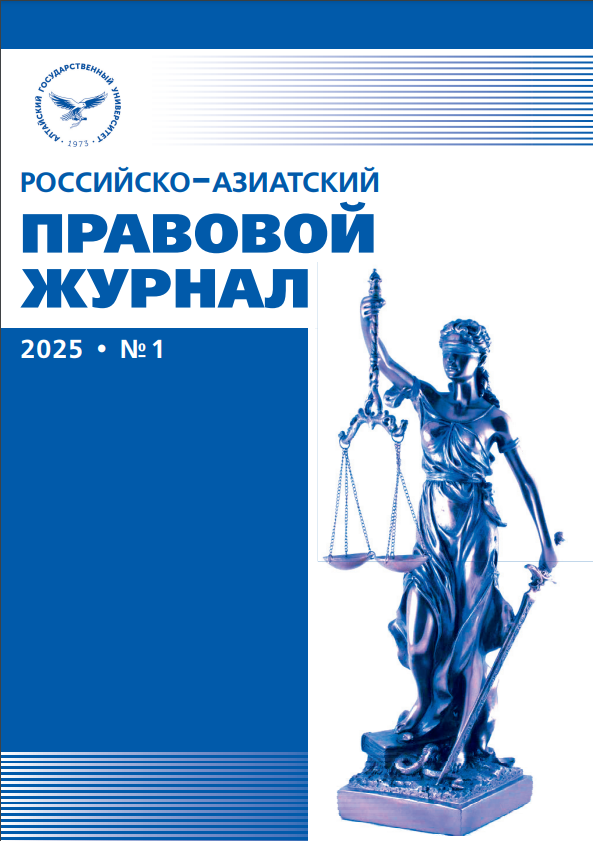FRAUDULENT MANIFESTATIONS OF FAKES AND DEEPFAKES: PROBLEMS OF COUNTERACTION
УДК 343.72 ББК 67.408.121.2
Abstract
Digital technologies have paved the way for fake crimes. One of the most popular crimes in the fieldof digital technologies is digital fraud, which is distinguished by the traditional method of deception, butwhich has acquired new features and patterns in the era of digital transformation. In modern realities, fraudcan be considered a classic example of a «fake» crime, since it is based on deception as an integral way ofcommitting it.Digital transformation has brought 2023 to a record number of digital crimes. According to officialstatistics of the Russian Ministry of Internal Affairs, there are more than 677,000 IT crimes. Compared to2022, the actual figures were a third lower, or equal to 522,000 such crimes.In 2023, the share of digital crimes increased to 34.8% compared to 2022, when the share of such crimeswas 26.5%. More than half of the registered crimes committed with the help of information technologiesbelong to the categories of grave and especially grave.In 2023, compared to the previous year, the number of crimes committed using the Internet increasedthe most in absolute terms. The figures increased from 381.1 thousand to 526.7 thousand. It is noteworthythat in second and third places were fraud committed using mobile communications and plastic cards. Also in the digital space, fake crimes using computer equipment, software and fictitious electronic payments havebecome more frequent.
Downloads
References
Кабанов П. А. Жертвы киберкраж как объект современной российской кибервиктимологии: криминологический анализ статистических показателей криминальной виктимности 2021– 2022 гг. // Виктимология. 2024. Т. 11, №1. С. 25–42. DOI 10.47475/2411–0590–2024–11–1–25–42.EDN TJLGYE.
Малышева Ю.Ю. Мошенничество при получении выплат: актуальные проблемы квалификации / Ю.Ю. Малышева // Право и государство: теория и практика. 2019. №4. С. 117–118. EDN GVUXNE.
Малышева Ю.Ю. Обман как способ совершения мошенничества с использованием электронных средств платежа по зарубежному законодательству // Право и государство: теория и практика. 2019. №2. С. 111–113. EDN ZSUSPZ.
Малышева Ю.Ю. Проблемы квалификации обмана как способа совершения мошенничества с использованием электронных средств платежа // Мониторинг правоприменения. 2018. №4. С. 31–33. EDN YTVDYL.
Малышева Ю.Ю. Обман как способ совершения мошенничества в сфере компьютерной информации // Право и государство: теория и практика. 2018. №9. С. 126–128. EDN YTAOHR.
Малышева Ю.Ю. Обман как основной способ совершения преступлений в условиях COVID-19 // Государство и общество: актуальные вопросы взаимодействия : материалы III Всерос. науч. практ. конф. с междунар. участием, Казань, 12 марта 2021 г. Казань : ЮрЭксПрактик, 2021. С. 258–260. EDN PVYQMT.
Малышева Ю.Ю. О мошенничестве с использованием электронных средств платежа в условиях пандемии COVID-19 // Государство и общество: актуальные вопросы взаимодействия : материалы III Всерос. науч.-практ. конф. с междунар. участием, Казань, 12 марта 2021 г. Казань : ЮрЭксПрактик, 2021. С. 261–263. EDN OTWQIE.
Рагулина А.В. Компьютерное мошенничество // Пробелы в российском законодательстве. 2016. №5. С. 41–49. EDN WDGHIN.
Сидоренко Э.Л. Криптовалюта и будущее цифровых финансов. М. : МГИМО МИД России, 2023. 36 с. EDN BZFRJM.
Талан М.В. Уголовно-правовая охрана экономических интересов как основа функционирования семьи // Семья и традиционные семейные ценности как духовно -нравственная основа развития общества и государства : сб. материалов Междунар. науч. практ. конф., Чебоксары, 18–20 апреля 2024 г. Чебоксары : Чувашский государственный университет имени И.Н. Ульянова, 2024. С. 402– 408. EDN QMLKVC.
Чалышева Ю.В. Фейки: Уголовно-правовая оценка // Закон и общество: история, проблемы, перспективы : материалы XХVII Межвуз. науч.-практ. конф. студентов и аспирантов, Красноярск, 20 апреля 2023 г. Красноярск : Красноярский государственный аграрный университет, 2023. С. 389–391. EDN XNZWBQ.
Copyright (c) 2025 Ю.Ю. Малышева

This work is licensed under a Creative Commons Attribution 4.0 International License.
Russian-Asian Law Journal is a golden publisher, as we allow self-archiving, but most importantly we are fully transparent about your rights.
Authors may present and discuss their findings ahead of publication: at scientific conferences, on preprint servers, in public databases, and in blogs, wikis, tweets, and other informal communication channels.
Russian-Asian Law Journal allows authors to deposit manuscripts (currently under review or those for intended submission) in non-commercial, pre-print servers such as ArXiv.
Authors who publish with this journal agree to the following terms:
- Authors retain copyright and grant the journal right of first publication with the work simultaneously licensed under a Creative Commons Attribution License that allows others to share the work with an acknowledgement of the work's authorship and initial publication in this journal.
- Authors are able to enter into separate, additional contractual arrangements for the non-exclusive distribution of the journal's published version of the work (e.g., post it to an institutional repository or publish it in a book), with an acknowledgement of its initial publication in this journal.
- Authors are permitted and encouraged to post their work online (e.g., in institutional repositories or on their website) prior to and during the submission process, as it can lead to productive exchanges, as well as earlier and greater citation of published work (See The Effect of Open Access).








